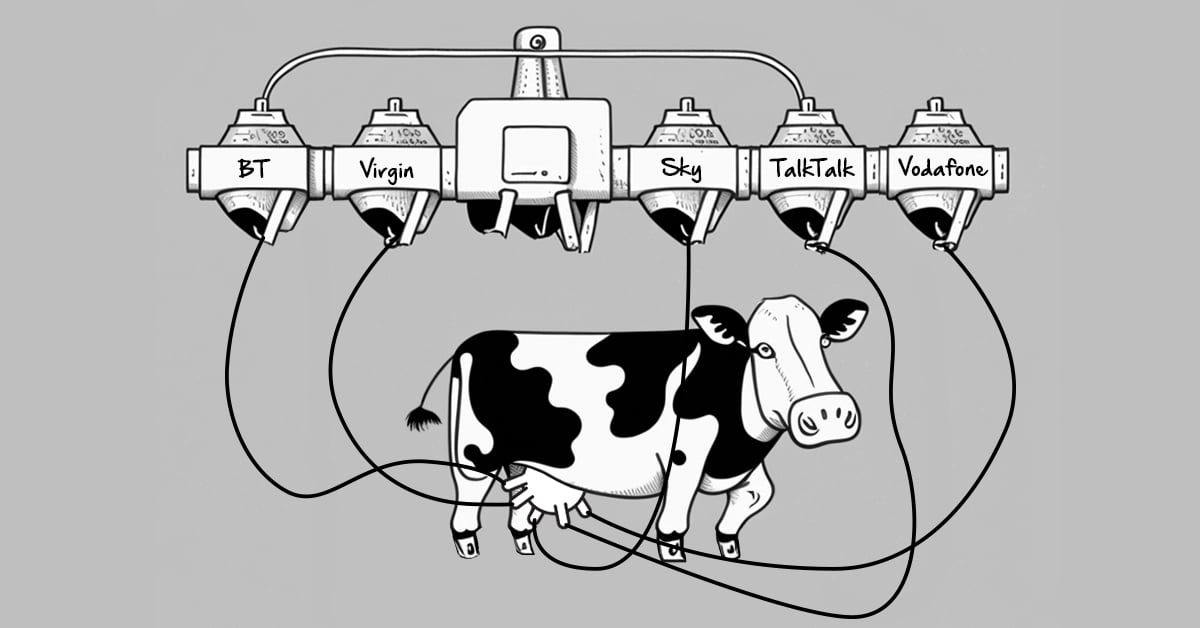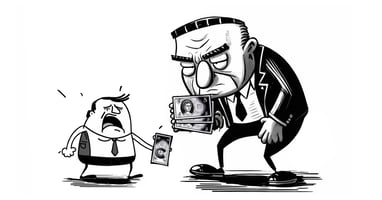Customers distrust broadband providers for good reason. The list of legitimate griefs is long. But...
Why I say "Big Broadband exploits their customers"

You’ll often hear me say that the UK broadband market is broken - that’s why it’s time for a rebellion. It’s no secret that customers are unhappy, and in previous posts I’ve explained why Big Broadband are never going to make their customers happy. They simply aren’t set up to meet the needs of the modern world. And you’re probably stuck with them (70% of UK broadband customers are trapped in a contract). You’re unhappy, but you’re not going anywhere.
You know this already. And so do they - the average tenure of a customer is 7.5 years. What you might not know is that it gets worse. Because they have you, they want more from you. So, they look to maximise profit.
I’m not against profit, but I am against exploiting customers to achieve it. Every business focuses their time and resources on one of two strategic priorities: long-term growth or short-term profit. The ability of the business to innovate and attract new customers is what determines the strategic path.
Big Broadband lack the fundamental ability to innovate, so their choice is made for them. They must focus on short-term profit. They need to pay dividends to shareholders, so they need those profits to increase. And they can only do that at your expense.
When a corporation needs to maximise short term profit, has a large and loyal base of customers, and operates against similarly exploitative competitors, then they stop seeing their customers as people and start treating them as cash cows.
Nobody wants to be a cash cow
When a business has identified a cash cow, they only do one thing: find ways to milk them. And nobody wants to be milked.
If you are a loyal customer who doesn’t want to go through the hassle of switching, then you, my friend, are a cash cow. Don’t worry, you’re not alone. There are 25 million Big Broadband customers.
That’s why you might have wondered why your broadband provider is so bad, or why prices keep rising yet the quality of your service is getting worse. It’s because that’s what they have to do to maximise profit.
Two forms of exploitation. Big Broadband do both.
Big Broadband’s purpose is both simple and singular: maximise profit per customer. They have two levers to do this: increase revenue per customer; and decrease cost per customer. Because they are earnest profit maximisers - determined milkers, if you will - they do both.
Lever 1: Increasing Revenue.
The obvious way to increase profit is to make customers pay more. To do this, these corporations use complex and misleading pricing schemes to significantly increase their prices. These schemes include above-inflation price rises (sometimes called ‘CPI+’) and the use of teaser rates with introductory offers. Sometimes, providers combine both tactics into a deadly cocktail that can increase your prices by over 100% year-on-year.
All these schemes are legal (for now) and are incorporated into customers’ contracts. The logic is simple: if you remain a loyal customer, then Big Broadband can steadily increase your prices and you will continue to pay. This is why industry observers call it the ‘loyalty tax’.
Since most customers pay by direct debit, you don’t even notice the changes in their monthly bills. Your provider does have to notify you, but when was the last time you read an email from your broadband provider? So you keep paying, lining their pockets a little bit more every month.
Lever 2: Decreasing Cost.
To decrease their cost per customer, legacy providers dissect their cost bases and determine the ‘discretionary’ services they can eliminate and the ‘premium’ services they can downgrade. Their test is simple: if they remove or downgrade a service and make more money than it costs in customer complaints, they do it.
So, instead of investing in service, your provider reduced their call centre hours, offshored their support teams, or replaced customer service agents altogether in favour of chatbots. These providers would rather wait for you to call and complain before fixing a known fault, because anything else is an unnecessary cost.
This is why it’s so painful to be a customer of Big Broadband. It also explains why, every year, it gets worse to be their customer. Your needs go up, your broadband stays the same, but your price goes up and your service goes down.
It all sounds a lot like a Cartel, doesn’t it?
A cartel is an association of suppliers with a shared purpose of maintaining prices at a high level and restricting competition. The top 5 providers - Big Broadband to you and me - control 91% of the market. Now, for legal reasons I can’t call them a cartel, and I’m not saying they’re all in cahoots, but they all play this dirty game.
And if they’re all the same, there’s no incentive to switch. The ‘better the devil you know’ mentality is completely rational. So you stay, and it all starts to feel a bit hopeless.
This pseudo-cartel might be malicious, but they aren’t stupid. They know how vulnerable they are to true competition. That is why they deploy over £300m in paid advertising every year. They come up with cute little slogans and boast of new [insert ridiculous adjective here] fibre broadband speeds.
They want to inundate customers with the perception of new products and choice, and they want to drown out competition.
They want you to continue playing their rigged game.
The UK lacked a credible national provider that stood up to Big Broadband.
That changed this week.




